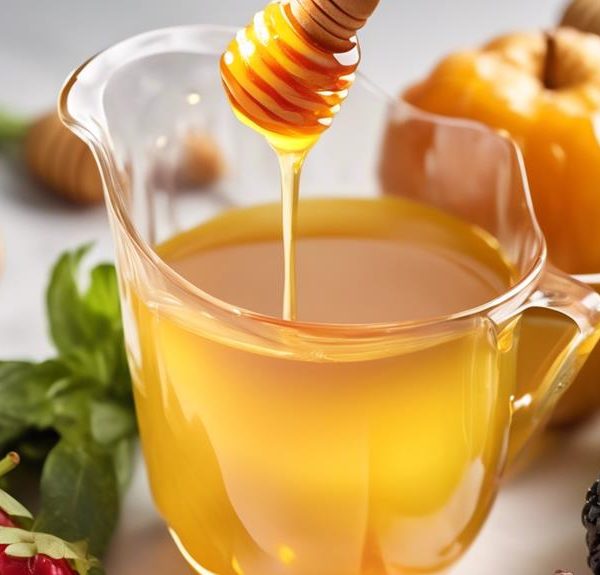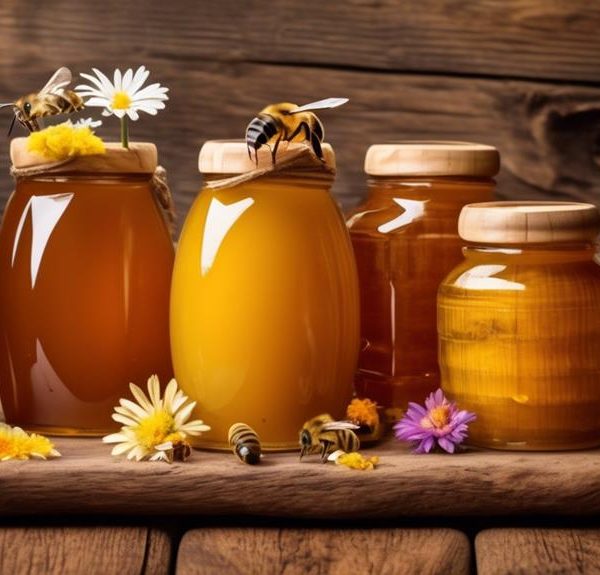Overflowing with sweet intrigue, explore the surprising truth about the carbohydrate content in honey and its impact on your health.
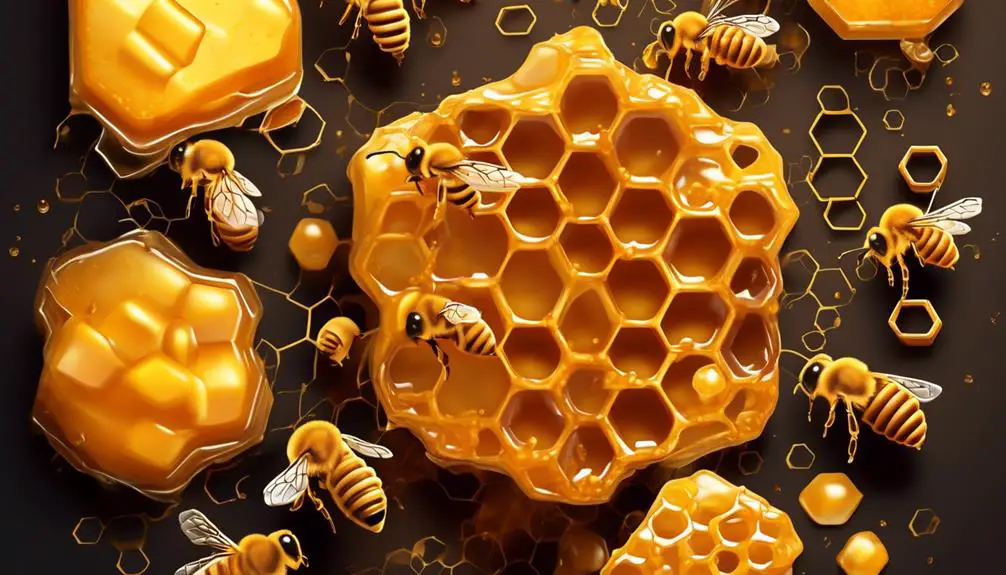
Are There Carbs in Honey
You've probably heard the theory that honey, nature's sweet nectar, is carb-free, but is this claim fact or fiction? Let's take a closer look at the composition of honey and its nutritional content.
As you navigate the maze of health information, it's essential to differentiate between various types of carbohydrates and understand the role they play in our diet.
The answer to this question might not be as straightforward as you expect, offering more than just a simple 'yes' or 'no.' So, why not stick around to uncover the sweet truth about honey's carbohydrate content?
Key Takeaways
- Honey is primarily composed of carbohydrates, making up about 82% of its content.
- The main sugars in honey are fructose and glucose, with one tablespoon containing around 17g of carbs.
- While honey provides quick energy, moderation is advised due to its high carb content which can contribute to weight gain.
- Comparatively, honey has a higher carb content than some other sweeteners like granulated sugar, agave nectar, and maple syrup.
Understanding Carbohydrates in Food
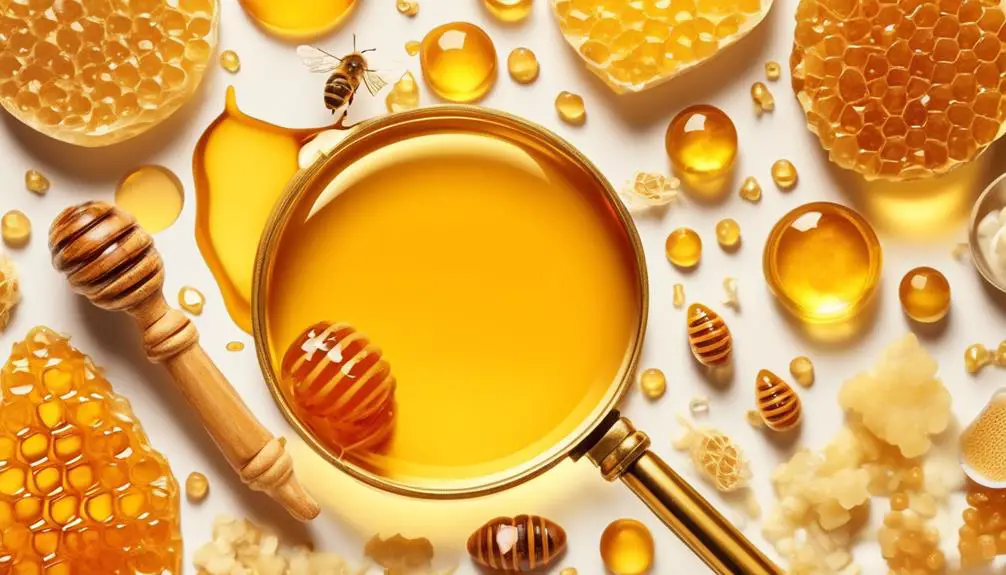
Diving into the world of carbohydrates, you'll find that they're a crucial component of many foods we consume daily, including honey. Carbohydrates are a major source of energy for your body. They're broken down into glucose, which is used by your body's cells for energy.
There are three main types of carbs: sugars, starches, and fibers. Sugars are the simplest form of carbs and are found naturally in fruits, milk, and honey. Starches are complex carbs found in foods like potatoes, rice, and bread. Lastly, fibers are carbs that your body can't digest. They're found in whole grains, fruits, and vegetables. Though not a direct energy source, they're important for digestion.
When you consume honey, you're ingesting a sugar-rich carbohydrate. Honey is primarily made up of fructose and glucose. It's a healthier alternative to refined sugar because it's natural and contains small amounts of vitamins and minerals.
Understanding the carbs in food is essential for maintaining a balanced diet. While it's necessary to get enough carbs for energy, it's equally important to ensure you're consuming the right kind. Aim for whole grains, fruits, and vegetables, and limit your intake of refined sugars.
The Composition of Honey

When you delve into the composition of honey, you'll find it's a complex mix of sugars, water, and small amounts of other substances like vitamins and minerals. The primary components are carbohydrates, making up about 82% of honey's composition. These carbs are mainly fructose and glucose, but you'll also find smaller amounts of other sugars, including maltose and sucrose.
Aside from carbs, water is the second most abundant substance in honey, accounting for about 17% of its content. This high carbohydrate and water content is what gives honey its thick, syrupy consistency.
Now, let's talk about the other substances in honey. Though they only make up about 1% of its composition, they're still significant. You'll find traces of vitamins and minerals, such as vitamin C, calcium, and iron. These nutrients contribute to the many health benefits of honey.
Proteins and amino acids are also present in small quantities. They're responsible for the enzymatic activities in honey, which contribute to its unique properties. So, while honey is indeed high in carbs, it's also packed with a variety of other beneficial components.
Carbohydrate Content in Honey
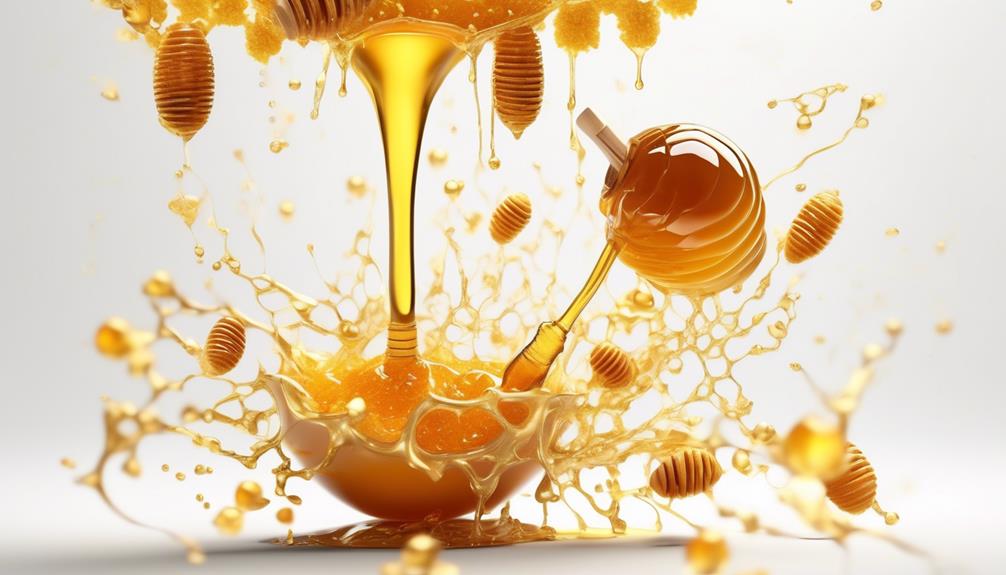
Let's delve into the carbohydrate content in honey, a crucial factor that defines its nutritional value and impact on your health. Despite being a natural sweetener, honey is high in carbs, with about 82% of its total weight coming from carbohydrates. This is primarily due to the two main types of sugars it contains – fructose and glucose.
Honey is a rich source of quick energy because these simple sugars are easily absorbed by your body. However, it's important to remember that these carbs add up, and consuming in large amounts can lead to weight gain and other health issues. It's not just about the sweet taste, but the type and amount of carbs you're taking in.
In a tablespoon of honey, you're looking at approximately 17 grams of carbs. That's quite high, especially when compared to other sweeteners. Hence, whilst honey can be a healthier alternative to processed sugars due to its beneficial antioxidants and minerals, it's essential to use it sparingly. Watch your portions and enjoy the sweetness of honey without overloading on carbs. After all, moderation is key when it comes to maintaining a balanced diet.
Comparing Honey and Other Sweeteners
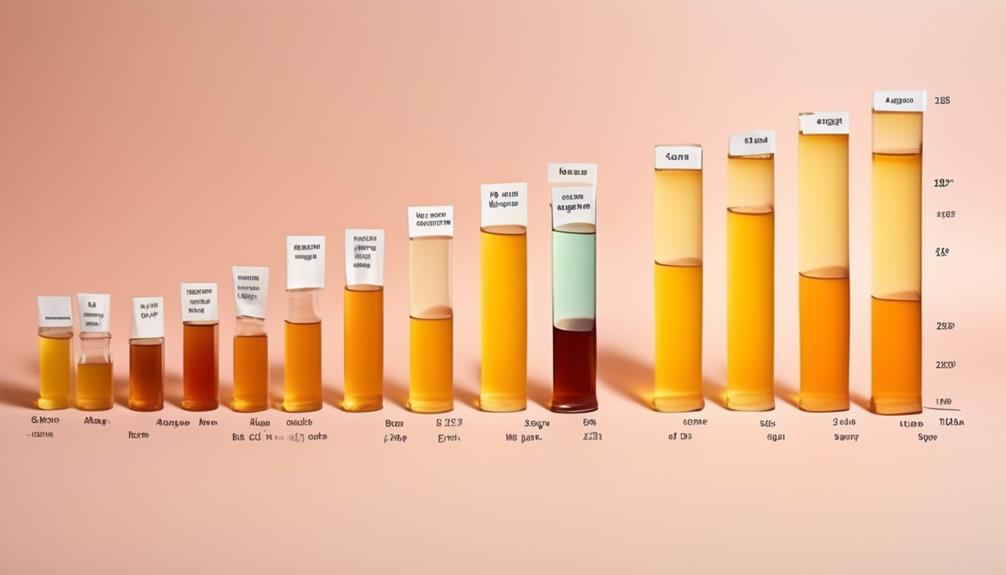
Now that you're aware of the carb content in honey, it's important to understand how it stacks up against other popular sweeteners. You might be surprised to learn that honey, which contains 17g of carbs per tablespoon, has slightly more carbs than granulated sugar, which contains about 12.6g per tablespoon.
If you're watching your carb intake, you might want to consider artificial sweeteners like sucralose or aspartame, which contain zero carbs. But remember, these are chemically processed and may have side effects. Natural alternatives like stevia also have no carbs and are considered healthier.
Then, there's agave nectar, a sweetener often hailed as a healthy alternative. However, it's packed with 16g of carbs per tablespoon, nearly as much as honey. What about maple syrup? A tablespoon has 13g of carbs, slightly more than white sugar.
Health Implications of Honey's Carbs
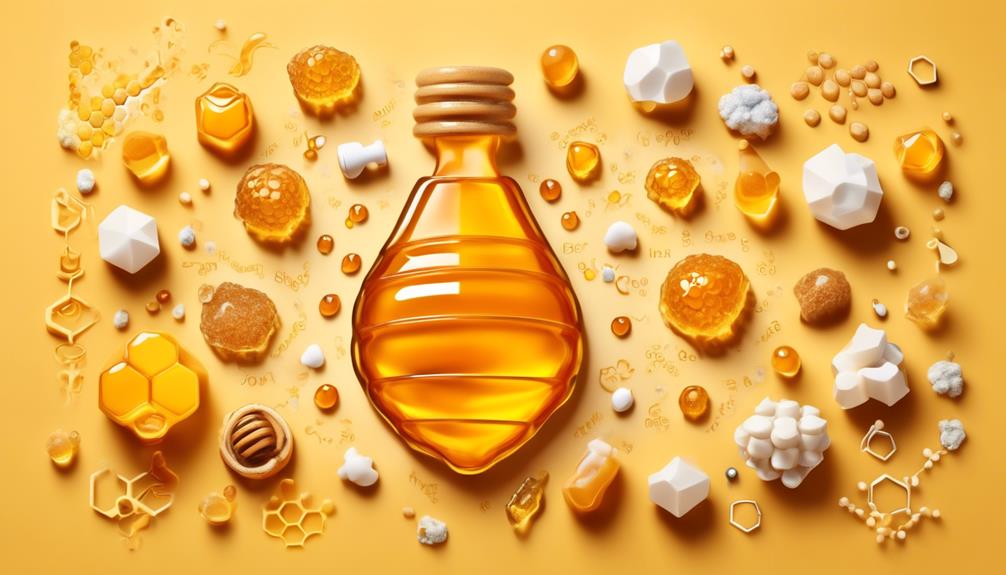
Despite its high carb content, honey's unique composition can have some potentially beneficial health implications for your body. Unlike refined sugar, honey contains trace amounts of vitamins and minerals. It also boasts a variety of antioxidants that can help to protect your body from free radical damage. This means honey might contribute to your overall wellbeing when consumed in moderation.
However, the carbs in honey are primarily composed of fructose, a type of sugar that's been linked to health issues like obesity, heart disease, and diabetes when consumed in excess. So, while honey may be a more natural alternative to refined sugar, it's still important to consume it in moderation.
Honey also has a lower glycemic index than sugar, meaning it won't spike your blood sugar levels as quickly. This can be particularly beneficial if you're trying to manage your blood sugar levels or if you're prediabetic or diabetic. But keep in mind, it's still a form of sugar, and any improvements to blood sugar control will likely be minimal.
Conclusion
Indeed, honey does contain carbs. Nearly all of its weight is carbs, primarily fructose and glucose.
While it may seem healthier than table sugar, it's still high in calories and should be used sparingly. Remember, despite its natural origins and health benefits, honey is still a sweetener.
So, enjoy it in moderation to avoid unwanted weight gain and potential impact on blood sugar levels. Make wise choices for your health, always!

